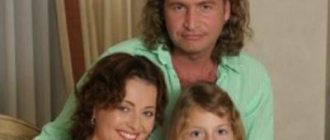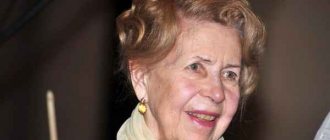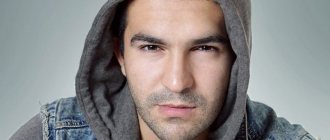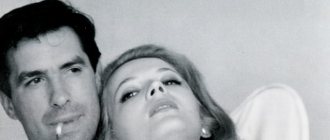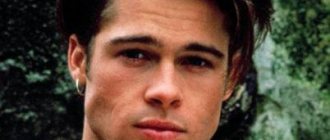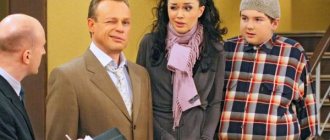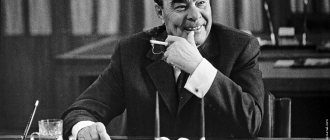Childhood and family
Theater and film actor Leonid Sergeevich Bronevoy was born on December 17, 1928 in Kyiv.
The artist’s parents met during their student years. Mother, Bella Lvovna Landau, studied at the economics department of the institute, and father, Solomon Iosifovich Bronevoy, studied at the law department. The father of the future actor grew up in Odessa, in the family of a pastry chef. In 1928, shortly before the birth of his son, Solomon Iosifovich, under the patronage of his older brother, ended up in the Kiev economic department of the GPU. In 1933, he was awarded the Order of the Red Star - one of the first in the USSR. A year later, he, at that time already a state security major, was appointed head of the 6th department of the NKVD in Ukraine.
In the photo: father and daughter of Leonid Bronevoy
Leonid Sergeevich characterizes his parents as follows: “They were crystal clear people - now this may sound funny. They believed in a bright idea, in revolution. My father was offered to work in the NKVD. My mother advised my father to go through the legal profession: then, they say, you will have to defend people, but in the NKVD they will force you to do a completely different thing, far from defense. My father didn’t listen and went to serve THERE. He wore one diamond, which corresponded to the rank of army general.”
Leonid Bronevoy in his youth
However, already in 1935 he was dismissed from the authorities and appointed manager of the capital's park of culture and recreation, and in 1936 he was accused of Trotskyism and arrested. He was released in 1954, but did not return to his family and lived in Rostov. In 2003 he was posthumously rehabilitated.
Bella Lvovna was in a panic: she was a young girl, only 27 years old, with her whole life ahead of her. Having listened to outside opinions, she divorced the “enemy of the people” and even changed her son’s middle name to Sergeevich. Life did not get better - as “the family of an enemy of the people,” mother and son were sent into exile in the Kirov region. In 1941, they were allowed to return to Kyiv, but the war began and a new round of ordeals began - evacuation to Central Asia.
Graduate of two theater institutes
Leonid Bronevoy in his youth. Photo: orinfo.ru
Leonid Bronevoy was born on December 17, 1928 in Kyiv. The future artist’s mother, Bella Landau, worked as an accountant. Father, Solomon Faktorovich, served in state security agencies. He changed his last name in 1918, during the Civil War. Faktorovich and his brothers destroyed the White Guards' armored car with a grenade, for which they were nicknamed the Bronevs. The actor recalled about his parents: “They were crystal clear people - now this may sound funny. They believed in a bright idea, in revolution.”
The Bronev family lived in the center of Kyiv, on the main street of the city - Khreshchatyk. Since childhood, Leonid Bronevoy has been involved in music. David Berthier, a teacher at the Kyiv Conservatory, gave him violin lessons.
When Leonid Bronevoy was eight years old, his father was accused of counter-revolutionary activities and arrested. The actor recalled: “They came at night... They took the Mauser and belt, my father put on his tunic, riding breeches, boots and said: “I’ll be back soon.” Solomon Bronevoy was given five years in the camps and exiled to Kolyma.
To avoid arrest, Bella Landau divorced her husband, changed her son’s middle name to Sergeevich and moved with him to the city of Malmyzh, Kirov region. They returned to Kyiv only at the beginning of 1941. But soon the war began, and Leonid Bronevoy and his mother were evacuated to Kazakhstan, to the city of Chimkent. The future artist was then studying at school. After school, he worked part-time in a bakery near his home and in the sewing workshop of the Chimkent Puppet Theater.
In 1944, Bronevoy graduated from school and, on the advice of his mother, entered the Tashkent Theater and Art Institute. From his first year, he worked as an announcer on a local radio, broadcasting in Russian and Uzbek. In the evenings, he worked part-time in eateries, singing and playing the accordion. He translated poetry from Uzbek for local publishing houses.
In 1950, Bronevoy graduated from the institute and was assigned to the Magnitogorsk Drama Theater. A.S. Pushkin. Soon he moved to Chkalov (now Orenburg). There Bronevoy joined the local theater troupe. During these years, the artist almost did not receive roles: the theater management believed that he did not have enough experience. One of his first works turned out to be completely wordless. Bronevoy was upset by this, but the director explained to him that creating an image with movements and facial expressions alone is as difficult a job as playing a role with text.
In 1953, Bronevoy went to Moscow to enter the Moscow Art Theater School. Before this, he wrote to actor Alexei Gribov and asked him to listen to him before the exams and give advice on admission. The performance impressed Gribov so much that the artist convinced the Moscow Art Theater teachers to audition Bronevoy even before the entrance exams. And he was immediately enrolled in the third year in the workshop of Alexander Karev. Bronevoy's classmates were Galina Volchek, Irina Skobtseva and Anatoly Kuznetsov.
Education
During the evacuation, Leonid, in order to somehow earn a living, worked wherever he had to. There, in Kazakhstan, he graduated from the seven-year school, and after that he entered the Ostrovsky Theater and Art Institute in Tashkent. After graduation, Bronevoy was assigned to the drama theaters of Orenburg and Magnitogorsk. But the thought of studying in Moscow did not leave him. Taking a risk, he came to Moscow and entered the Moscow Art Theater School - immediately into his third year. After graduating from the studio school, Leonid Sergeevich went to work in theaters in Irkutsk, Voronezh, and Grozny.
In 1961, Bronevoy returned to Moscow, getting a job at the Drama Theater on Malaya Bronnaya. In a short time he became a leading actor - he played the role of Capulet in the famous performances “Romeo and Juliet”, the role of Shpigelsky in “A Month in the Country” and others.
Congratulations from Dmitry Medvedev
Later he moved to the Lenkom Theater, where he was involved, among other things, in productions of “The Cherry Orchard,” “The Seagull,” “The Executioner’s Executioner,” and others.
Leonid Bronevoy excommunicated his daughter
For nine years the People's Artist has not seen his only heiress
On December 17, the magnificent Leonid BRONEV turns 84 years old. Endowed with natural charm and a unique acting gift, in ordinary life he is known as a private person. In September, during a tour of the Lenkom Theater in Kyiv, Bronevoy was admitted to intensive care with an acute myocardial infarction. Almost a month later, when Leonid Sergeevich felt a little better, he returned to Moscow by train and admitted that in difficult times only his wife supported him. “And I don’t need anyone else next to me,” the master said at the station. But why didn’t the artist remember his only daughter, who was born in his first marriage? About this and other family secrets of the performer of the roles of Muller in “Seventeen Moments of Spring” and Velurov in “Pokrovsky Gates” - in our investigation.
“Recently, when my father fell ill in Kiev, I really wanted to fly to him, but it turned out that they weren’t really waiting for me there,” shared Valentina Leonidovna, Bronevoy’s . “I don’t want to blame either dad, or his wife Victoria Valentinovna, or anyone... But I haven’t seen Leonid Sergeevich for many years. My father, like many talented people, has a complex character. Of course, children and parents are not chosen. What to do, it just happened. But I don’t give up hope that someday, as before, I will communicate with my dad again. I really want this!
| With his first wife Valentina BLINOVA |
Worked part-time on the boulevard
He met the mother of his only daughter, Broneva, while studying in Moscow. He studied at the Moscow Art Theater School, and his future wife studied at the Shchukin School.
“Lenya came to us right away in his third year,” recalls Lyudmila Ivanova , the future Shurochka from “Office Romance.” — Before that, he studied at the Tashkent Theater and managed to work in Magnitogorsk, where he played Lenin. As an adult, he looked older than his years. He was gallant with girls, loved to play music, excellently playing jazz melodies on the piano. So imposing, friendly, wise, with good humor, but very closed. He looked down on the love triangles of other students. For example, Tolya Kuznetsov fell in love with Anya Goryanova , Anya was crazy about Pyotr Fomenko . But Bronevoy didn’t pay much attention to any of our girls.
| Little Valechka with a portrait of her father |
Perhaps Leonid’s modesty in amorous matters was influenced by his first unrequited love.
In 1942, when our hero was 14 years old, he and his mother went to evacuation from their native Kyiv to Chimkent. And there, during the drama club classes at the House of Pioneers, I lost my head over a young ballerina. But the short Jewish boy with a piercing gaze did not impress the dancer at all, and she ignored all his signs of attention, snorting contemptuously. And only a fateful meeting with Muscovite Valentina Blinova , his future wife, was able to change Leonid’s attitude towards the female sex. After the wedding, the young couple faced many trials. Along with their diplomas, Lenya and Valya received assignments to peripheral theaters. First to Grozny, then to Irkutsk, then to Voronezh. We had to live in cramped hotel rooms.
| When the actor returned to Moscow by train after suffering a heart attack in Kyiv, he was carefully taken along the platform to the ambulance. |
In the capital of the Black Earth Region, Blinova realized that she was expecting a child.
At Bronevoy’s insistence, the born daughter was named Valya, in honor of her mother. When their baby was not even four years old, doctors discovered lung cancer in Valentina Sr. “She never smoked in her life,” says her daughter, Valentina Leonidovna. — Doctors concluded that the oncology was caused by injury. One day my mother stumbled on stage and fell, hitting her ribs hard on the floor. As a result, a tumor began to develop and metastases began.
Due to the serious illness of his wife, Broneva and his family left Voronezh for Moscow in the hope that his Valechka would be saved there. But the capital's luminaries just shrugged their shoulders - doctors in those years were completely helpless in the face of such ailments. Valentina soon died.
“Mom was buried at the Kuzminskoye cemetery,” continues the actor’s daughter. “And Varvara Ivanovna, the sister of my grandmother, my mother’s mother, agreed to help raise me. She herself has been disabled since childhood, devoted her whole life to me (and later babysat my daughter). We lived in a huge communal apartment for 26 residents. It was difficult for my father, because at first he could not find a job at all.
| Valya with her grandfather - my father's father, Solomon Iosifovich. (The future artist’s mother changed his patronymic to Sergeevich when Solomon, an NKVD major, was repressed in 1936. He was released from prison ten years later and was later rehabilitated.) |
The famous critic Boris Poyurovsky , Bronevoy’s biographer, said that the young actor, having arrived to conquer Moscow, even went hungry.
“Leonid showed in many theaters, but they didn’t take him,” Poyurovsky shared. - Even former classmates at the studio school - Efremov , Tabakov and Volchek were not accepted into Sovremennik. The fact is that there was already an actor with a similar type - Evgeny Evstigneev . Finally, the director-in-chief of the Pushkin Theater, Boris Ravenskikh, agreed to place Leonid on staff. But only from the new season. And in order to feed himself and his little daughter for the remaining few months, Bronevoy was forced to go to Tverskoy Boulevard. There, board game lovers played checkers, chess and dominoes for money. Having hardly won his 50 kopecks or a ruble, Leonid hurried to the store for bread and milk.
| They used to be a friendly family: Valentina, the actor’s current wife Victoria, son-in-law Anatoly, granddaughter Olenka and the same Varvara Ivanovna who became the nanny first of Valya and then of Olya |
Housing problem
Bronevoy was a widower for almost ten years, until he decided to propose to a woman whom he had known since 1965.
“I don’t know if my father was a Don Juan, but when we lived together, he didn’t take ladies into the house,” says the daughter. — His second wife was engineer Victoria Valentinovna. After the wedding, dad received a new apartment, where he and his wife settled. And I stayed with the nanny. At school and at university (I graduated from the Maurice Thorez Institute of Foreign Languages) I never boasted of my relationship with Bronev. And my father didn’t help me get settled in life. I worked for 27 years at the State Television and Radio World Broadcasting Service, and now I work as a translator for a commercial company. In my second, current marriage, I gave birth to a daughter and gave her the name Olya - that’s what my mother once dreamed of calling me. My husband Anatoly is a professor, Doctor of Economics, teaches at the Academy of Civil Service under the President of Russia. Our Olenka is smart, she will soon turn 25 years old. She studied in the UK, and is now going to take an international exam and find a job with an economic focus, where a good knowledge of English is required.
All questions about her father resonate with pain in Valentina’s heart. It is clear that she is very worried that she cannot see Leonid Sergeevich.
| Valentina Leonidovna with her daughter Olya |
“At one time we communicated well,” the master’s daughter sighs heavily.
“He came to visit us and played with his granddaughter. He invited me to his anniversaries. And suddenly a protracted period of misunderstanding began... Men often fall under the influence of their wives. I can only guess, but maybe this happened to my dad too. Is this betrayal on his part? I don't want to think about such things. The Lord is the judge. Yes, my father and his wife have an apartment in the center. Perhaps Victoria Valentinovna and her relatives are afraid that I can somehow lay claim to this housing? But I make good money and I don’t need anything. Only communication with dad. I haven't seen him for nine years! I try to call, but he answers very dryly and briefly that everything is fine, and then immediately makes it clear that the conversation is over. I hoped that everything would change on my father’s 80th birthday. I tried to congratulate him, but neither Olya nor I was invited to the celebration. Dad himself hasn’t congratulated us for a long time. I am not one of those who will sort things out and make assessments. Anything can happen in life. But I want the father to understand: his daughter and granddaughter really want to see him! Colleagues at Lenkom do not consider Bronevoy to be henpecked.
| At one time, during the New Year holidays, BRONEVOY always came to his daughter’s house with congratulations |
“This is absolutely not true,” says Lyudmila Lisova , who has worked side by side with the master for many years.
“It’s just that Leonid Sergeevich extremely respects his wife. As long as I remember him, I always wanted to go home, saying that Victoria Valentinovna was bored there alone. Bronevoy is a personality, he could make mistakes and be harsh, but he always hated lies, hypocrisy and sycophancy. After these words, I wanted to talk frankly with Bronev himself. But I was able to talk only with his wife.
— How does Leonid Sergeevich feel?
“He and I are now in a sanatorium in the Moscow region,” she answered. — We bought a ticket. My husband is undergoing rehabilitation, he feels better, I am with him all the time. He still doesn’t think about when he will return to the stage; he has a replacement in all Lenkom performances.
— What gifts does the actor expect for his 84th birthday?
- Now he has no time for gifts. If only he gets well, and I do everything he asks.
— Valentina’s daughter is worried that she has not been able to fully communicate with her father for a long time. Maybe if they start being friends again, this will be the main present for Bronevoy?
“They already communicate, everything is fine,” the actor’s wife said nervously and after a pause hurried to end the conversation. “I need to go do procedures for my husband.” Goodbye!
Leonid Bronevoy: film roles
The role after which Bronevoy woke up famous, he played in the legendary film “Seventeen Moments of Spring.” As we all remember, Leonid Sergeevich played Muller brilliantly. It’s impossible not to remember this character’s catchphrase: “And you, Stirlitz, I’ll ask you to stay…”. Next, Bronevoy played in the no less famous film, “Formula of Love.” Then came more roles in wonderful films. But the viewer, apparently, saw the well-known Muller in this man:
Bronevoy’s famous films: “Pokrovsky Gate”, “That same Munghausen”, “Promised Heaven”, “Did you call the doctor?”, “Please speak”, “What are our years”, “Physicists”, “Schizophrenia” and many other wonderful films. Leonid Sergeevich even took part in the dubbing of cartoons: “Plasticine Crow”, “Koloboks are Investigating”.
The legendary role of Leonid Bronevoy (“17 Moments of Spring”)
Long failures
With Oleg Menshikov in the film “Pokrovsky Gate” (1982)
The capital did not submit to Bronevoy immediately. Auditions in theaters failed one after another, there was no money, and I had to live with the relatives of the late Valentina.
It got to the point that he began to earn money by playing dominoes - a ruble in two days.
“This is, of course, funny, but still two loaves of bread for 15 kopecks, a carton of milk or cottage cheese. Do you know what the rules are in dominoes? If you win, you do not have the right to leave the bench. But I broke this unwritten law. I win a ruble and leave. “Oh you!..” - they’ll swear at me. I explained to them what was going on, and then they began to forgive me for leaving with the winnings,” Bronevoy said in an interview with AiF. Finally, he was accepted into the troupe of the Theater on Malaya Bronnaya, where he worked for more than 20 years, playing many bright roles - but not a single main one. This was the paradox of Leonid Bronevoy’s acting fate: both in cinema and in the theater, he was able to decorate any work with his acting, but he always did it in supporting roles.
They brought him all-Union fame and the love of the audience. The first fateful supporting role was, of course, his Müller in “Seventeen Moments of Spring.”
“And you, Stirlitz, I’ll ask you to stay” and other quotes
Seventeen Moments of Spring (1973)
In one of his last interviews, Leonid Bronevoy admitted that he would have refused the role of Muller if he had been shown his real photograph. Outwardly there is no similarity between them. But the image created by Bronev was remembered by the audience no less than the main one - Stirlitz. “I don’t renounce Muller, he has already stuck to me, like Chapaev to Babochkin, and it seems to have been a worthy job,” said Bronevoy. “At the same time, there are enchanting inconsistencies with historical truth - to begin with, I don’t look like Müller at all, and thank God they never showed me his photograph. Everyone said that there was no good one. If I had seen how different I was from him, I would have refused the role.”
That Same Munchausen (1979) After Muller there were the Duke from the film “That Same Munchausen”, the inimitable Velurov from the Pokrovsky Gate, the imperturbable Doctor from “The Formula of Love” - the whole country spoke with the replicas of Bronevoy’s heroes.
He was already approaching 40 when he gained fame at the level of the Soviet Union. Perhaps this was the reason that until the end of his days the actor did not like to give interviews and lived a solitary life.
After a long illness...
After waiting for his daughter to come of age, Leonid Bronevoy remarried. His wife Victoria has nothing to do with the world of art: she is an engineer by profession, and was with the actor for many years before they got married. Victoria managed to leave her husband five years ago, when Bronevoy had a massive heart attack. After the alarming news about the operation, fans breathed a sigh of relief: on May 28, 2014, Leonid Bronevoy again appeared on the stage of the Lenkom Theater.
But the actor never managed to recover completely. In September 2017, he still came to the meeting of the Lenkom troupe, but a couple of months later he was hospitalized again. Three weeks before Leonid Bronevoy’s death, he was transferred to intensive care, but was not saved. The actor died a week before turning 89. At parting, music was played from “Seventeen Moments of Spring” - the film that once discovered Bronevoy for us.
Just a few words in honor of Monsieur de Molière (1973)
Personal life of Leonid Bronevoy
The first wife of Leonid Sergeevich Bronevoy was actress Valentina Blinova, a graduate of the Shchukin School. She died of cancer when their daughter Valentina was 4 years old.
Leonid Bronevoy with his first wife
Valentina Leonidovna did not follow in the footsteps of her famous father: after graduating from the Linguistic Institute, she worked for almost 30 years at the State Television and Radio Broadcasting Company.
Valentina, daughter of Leonid Bronevoy
Valentina gave her father a granddaughter, Olga.
In the photo: Valentina and Olga
The actor’s second wife was a woman far from the world of theater - engineer Victoria Valentinovna.
With his second wife Victoria Valentinovna Broneva
Personal life
Leonid Bronevoy with his first wife Valentina Blinova. Photo: stuki-druki.com
Leonid Bronevoy as Fyodor and Rimma Manukovskaya as Nila Snezhko in Firs Shishigin's play "The Drummer". Voronezh State Academic Drama Theater named after. A. Koltsova, Voronezh. Photo: voronezhdrama.ru
Leonid Bronevoy with his second wife Victoria Bronevoy. Photo: stuki-druki.com
Leonid Bronevoy was married twice. His first wife was actress Valentina Blinova. The artist met her in the early 1950s in Moscow. Blinova was then a student at the Theater School named after. Shchukin. Soon they got married. Bronevoy and Blinova worked together in the Grozny, Irkutsk and Voronezh theaters. In 1958, the couple had a daughter, Valentina.
In the early 1960s, the actor's wife became seriously ill. To cure her, Bronevoy decided to move to Moscow. However, in 1962, Valentina Blinova died. A relative of his wife, Varvara Blinova, helped Bronevoy raise his daughter.
The artist's second wife was engineer Victoria. They met in the late 1960s. Victoria Bronevaya was a fan of the actor and saw him off several times after performances. They got married in 1964 and lived together for more than forty years.
At the very beginning of filming [Seventeen Moments of Spring], I married for the second time - to my current wife, Victoria Valentinovna. The wedding day coincided with the start of filming. In the morning, several friends and I took champagne and went to the registry office, from there we went straight to the set, without even having time to drink champagne. The wife then burst into tears. I told her, consoling her, that this is a good omen, which means there will always be a lot of acting work...
From the book by Fyodor Razzakov “Dossier on the Stars”
Awards
In 1971, he became an Honored Artist of the RSFSR, and later Bronevoy received the People's Artist of the RSFSR, USSR. He has the Order of the Red Banner of Labor and the Order of Merit for the Fatherland. Leonid Sergeevich also received the State Prize of the Russian Federation.
For the role of Muller, Bronevoy was awarded the State Prize of the RSFSR named after the Vasilyev brothers. For the best supporting actor in the film “Simple Things” he receives the Nika Award. Leonid Sergeevich becomes an academician of the Russian Academy of Cinematographic Arts "Nika".
Origin
As stated in Wikipedia, this wonderful actor was born in 1928, on December 17th. The place of his birth is Kyiv. His Mother, Bella Lvovna Landau, was an accountant. Father, Solomon Lvovich, worked in the economic department of the NKVD. He had a legal education. He was Jewish by nationality, since his father and mother were of this nationality.
The real name of the father of the future actor was Faktorovich. He became Bronev with the participation of his brothers. During the revolutionary events, one of them, during the fighting in Odessa, captured an armored car from the enemy. From then on, the brothers began to be called "Armored", which soon turned into "Armoured". Over time, they decided to officially change their last name.
Father, Solomon Iosifovich Bronevoy, grew up in Odessa, in the family of a pastry chef. He was a participant in the Civil War. He worked in the OGPU from 1920 to 1923. Then he worked in the apparatus of the Institute of National Economy in Kyiv. In 1927 he was fired on charges of Trotskyism. However, in 1928, with the help of his brother, who was at that time the Minister of Health of the Ukrainian SSR, he went to work in the NKVD.
In 1937 he was repressed on charges of Trotskyism, and in 1946 he was released and sent to a settlement, from which he was able to leave in 1954. In 2003, he was posthumously rehabilitated.
Mother and father met and got married while she was a student and he worked in the apparatus of the Institute of National Economy.
Childhood and adolescence
Leonid spent his childhood in Kyiv. The Bronev family lived in the city center on Khreshchatyk in a spacious and bright four-room apartment. Little Lenya's parents sent him to a music school at the Kyiv Conservatory, where he learned to play the violin. His teacher was the famous Soviet conductor and violinist David Solomonovich Berthier.
In 1935, my father was fired from the authorities and appointed to the position of director of the city park of culture and recreation. A year later he was arrested and sentenced to five years in prison; he was accused of Trotskyism. Leonid and his mother, as “the family of an enemy of the people,” were deported to the Kirov region to the city of Malmysh. Bella Lvovna was not yet thirty years old at that time. She was very worried about the fate of her only son, so she followed the advice of her friends, filed for a divorce from her arrested husband and changed Leonida’s patronymic from Solomonovich to Sergeevich.
In the exile settlement they lived in hunger and cold. At the beginning of the summer of 1941 they returned to Kyiv, but a few days later a terrible war began. And again moving, now for evacuation, to the city of Chimkent in the south of Kazakhstan. Here Leonid completed seven classes at secondary school No. 10. To support himself and his mother, he had to work as an assistant in the sewing workshop of a puppet theater, a baker's apprentice, and a secretary-typist.
For the remaining three classes, Bronevoy passed all exams during the year and received a certificate of secondary education. He really wanted to study further as a journalist or diplomat, but with the stigma of being “the son of an enemy of the people,” this was impossible.
The father's sentence was increased to ten years with the right to correspondence. In 1946 he was released from prison. The family was never reunited because my mother didn’t want to. Leonid communicated with his father until his death.
Biographical information
Bronevoy's parents' names were Solomon Iosifovich and Bella Lvovna. Father served in the NKVD; he was arrested in 1937, but was limited to exile with his family to the Kirov region. His mother divorced him and changed her son’s patronymic so that there would be no connection with the “enemy of the people,” after which she returned with her son to Kyiv. During the war they were evacuated to Kazakhstan.
Before the war, Bronevoy studied violin at the music school at the Kyiv Conservatory. During the evacuation, he graduated from the 7th grade of school. As the son of an enemy of the people, he had problems getting into educational institutions, but his mother found ways to overcome this. Graduated from the Tashkent Theater Institute (1950).
Bronevoy worked in Magnitogorsk, Orenburg, in 1953 (when Stalin died) he left the theater and went to Moscow to study. He was admitted to the Moscow Art Theater School straight into the 3rd year. Upon graduation (1955) he worked in Grozny. In 1955-58 in Irkutsk (played mainly episodic roles).
Since 1958 in the troupe of the Voronezh Theater, where he immediately became a leading actor. Here he played the roles: Lenin (“The Third Pathetic” by N.F. Pogodin, 1958), Sorin (“The Seagull” by A.P. Chekhov, 1960), Fedor (“The Drummer” by A.D. Salynsky, 1960), etc.
In 1962–88 he was an artist at the Moscow Theater on Malaya Bronnaya. Performed the roles of: Capulet (“Romeo and Juliet” by W. Shakespeare, 1970), Blokhin (“Tales of the Old Arbat” by A.N. Arbuzov, 1971), etc.
Since 1988 Broneva at the Lenkom Theater (Krutitsky, “The Sage” based on A.N. Ostrovsky’s play “Enough Simplicity for Every Wise Man,” 1989).
Filmed on TV: Shuisky (“Boris Godunov”, 1972), Muller (“Seventeen Moments of Spring”, 1973), Regular (“Wedding as a Wedding”, 1974), Velurov (“Pokrovsky Gate”, 1983) and in cinema (“ Formula of Love", "The Same Munchausen").
Broneva's art is marked by subtle humor and careful development of characters. Playing heroes from different eras, he endows them with originality, originality, and was able to create a complete and living image.
People's Artist of the USSR (1987).
Bronevoy was married and has a daughter. At the beginning of the 21st century he lived in Moscow.

